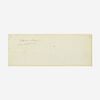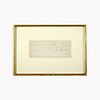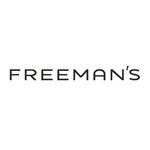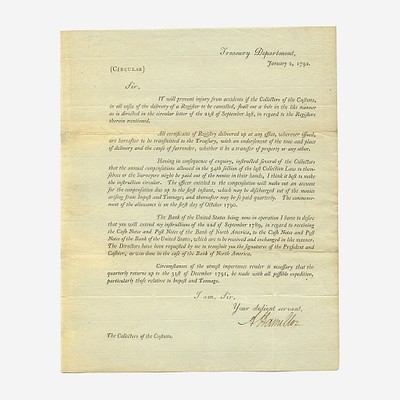[Hamilton, Alexander] [First Bank of the United States] Autograph Check, signed
About Seller
2400 Market St
Philadelphia, PA 19147
United States
Established in 1805, Freeman’s Auction House holds tradition close, with a progressive mind-set towards marketing and promotion, along with access to a team of top experts in the auction business. And now with offices in New England, the Southeast, and on the West Coast, it has never been easier to ...Read more
Two ways to bid:
- Leave a max absentee bid and the platform will bid on your behalf up to your maximum bid during the live auction.
- Bid live during the auction and your bids will be submitted real-time to the auctioneer.
Bid Increments
| Price | Bid Increment |
|---|---|
| $0 | $25 |
| $500 | $50 |
| $1,000 | $100 |
| $2,000 | $200 |
| $3,000 | $250 |
| $5,000 | $500 |
| $10,000 | $1,000 |
| $20,000 | $2,000 |
| $30,000 | $2,500 |
| $50,000 | $5,000 |
| $100,000 | $10,000 |
About Auction
Oct 25, 2021
Freeman's is honored to present The Alexander Hamilton Collection of John E. Herzog, a single-owner sale of Alexander Hamilton material, on October 25. Curated by Darren Winston, Head of the Books and Manuscripts Department. Freeman's info@freemansauction.com
- Lot Description
[Hamilton, Alexander] [First Bank of the United States] Autograph Check, signed
Exceedingly rare check completely in the hand of Alexander Hamilton, and drawn on the very bank he created
Philadelphia, February 18, 1795. One sheet, 3 x 7 3/4 in. (76 x 197mm) (sight). Autograph Check, signed and executed entirely in the hand of Alexander Hamilton: "Cashier of The Bank of The U States Dollars 360/Pay to Edward Jones or order Three/hundred fifty Dollars Philadelphia/February 18, 1795�Alexander Hamilton"; endorsed by Jones on verso. Unexamined out of mat and double-pane glass gilt frame, 10 x 14 1/2 in. (254 x 368mm).
A very rare check signed and executed completely in the hand of Alexander Hamilton, with his scarce full signature, ten days after resigning as the first Secretary of the Treasury, and drawn on the bank he created, The Bank of the United States. Edward Jones (ca. 1755-1829) was the first chief clerk of the Treasury Department, was appointed by Hamilton in 1790, and served for 39 years until his death.
The Bank of the United States was established by a bill passed on January 20, 1791, with a charter of 20 years. Modeled after European central banks like the Bank of England, Alexander Hamilton designed the National Bank to work in tandem with the newly established Mint and Treasury, and work for the government while also propelling the economy forward. Its foundation though was not without controversy, as the passage of the bill fell neatly along partisan lines, with Federalists in the North overwhelmingly supporting it, while Southern politicians were vehemently and vocally against its establishment. It proved to be a partisan issue for decades to come.
We can locate only two other checks from Hamilton in the auction record. Extremely rare.
Christie's, New York, Books and Manuscripts, 12/5/2006, Sale 1770, Lot 246.
Sotheby's, New York, The Collection of the Late Joseph M. Roebling, April 28, 1981, Sale 4588 Lot 57
- Shipping Info
-
No lot may be removed from Freeman’s premises until the buyer has paid in full the purchase price therefor including Buyer’s Premium or has satisfied such terms that Freeman’s, in its sole discretion, shall require. Subject to the foregoing, all Property shall be paid for and removed by the buyer at his/ her expense within ten (10) days of sale and, if not so removed, may be sold by Freeman’s, or sent by Freeman’s to a third-party storage facility, at the sole risk and charge of the buyer(s), and Freeman’s may prohibit the buyer from participating, directly or indirectly, as a bidder or buyer in any future sale or sales. In addition to other remedies available to Freeman’s by law, Freeman’s reserves the right to impose a late charge of 1.5% per month of the total purchase price on any balance remaining ten (10) days after the day of sale. If Property is not removed by the buyer within ten (10) days, a handling charge of 2% of the total purchase price per month from the tenth day after the sale until removal by the buyer shall be payable to Freeman’s by the buyer. Freeman’s will not be responsible for any loss, damage, theft, or otherwise responsible for any goods left in Freeman’s possession after ten (10) days. If the foregoing conditions or any applicable provisions of law are not complied with, in addition to other remedies available to Freeman’s and the Consignor (including without limitation the right to hold the buyer(s) liable for the bid price) Freeman’s, at its option, may either cancel the sale, retaining as liquidated damages all payments made by the buyer(s), or resell the property. In such event, the buyer(s) shall remain liable for any deficiency in the original purchase price and will also be responsible for all costs, including warehousing, the expense of the ultimate sale, and Freeman’s commission at its regular rates together with all related and incidental charges, including legal fees. Payment is a precondition to removal. Payment shall be by cash, certified check or similar bank draft, or any other method approved by Freeman’s. Checks will not be deemed to constitute payment until cleared. Any exceptions must be made upon Freeman’s written approval of credit prior to sale. In addition, a defaulting buyer will be deemed to have granted and assigned to Freeman’s, a continuing security interest of first priority in any property or money of, or owing to such buyer in Freeman’ possession, and Freeman’s may retain and apply such property or money as collateral security for the obligations due to Freeman’s. Freeman’s shall have all of the rights accorded a secured party under the Pennsylvania Uniform Commercial Code.
-
- Buyer's Premium



 EUR
EUR CAD
CAD AUD
AUD GBP
GBP MXN
MXN HKD
HKD CNY
CNY MYR
MYR SEK
SEK SGD
SGD CHF
CHF THB
THB![[Hamilton, Alexander] [First Bank of the United States] Autograph Check, signed](https://s1.img.bidsquare.com/item/l/9470/9470983.jpeg?t=1MwoEU)
![[Hamilton, Alexander] [First Bank of the United States] Autograph Check, signed](https://s1.img.bidsquare.com/item/s/9470/9470983.jpeg?t=1MwoEU)













